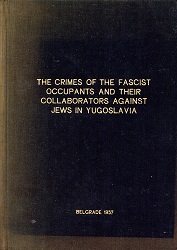
THE CRIMES OF THE FASCIST OCCUPANTS AND THEIR COLLABORATORS AGAINST JEWS IN YUGOSLAVIA
Published by Federation of Jewish Communities of the Federative People’s Republic of Yugoslavia, Belgrade 1957
More...We kindly inform you that, as long as the subject affiliation of our 300.000+ articles is in progress, you might get unsufficient or no results on your third level or second level search. In this case, please broaden your search criteria.

Published by Federation of Jewish Communities of the Federative People’s Republic of Yugoslavia, Belgrade 1957
More...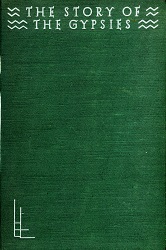
I am attempting to unravel the story of a people whose vocabulary lacks two words — ‘duty’ and ‘possession.’ For hundreds of years the Gypsies have lived beside us —in the Orient and in the Occident, in Egypt as well as in England, in Syria and in France, in Italy, in Germany, in Turkey, on the frozen plains of Russia, in the Pusta of Hungary, on the barren rocky mountains and in the fertile valleys of Wallachia, in Australia and in the Americas — and we neither know nor understand them. What we know about them compared with what they know about us is like but a drop of water in the vast ocean. They do not live as we do because they do not consider our manner of living good enough for them, because they are not like the vintners who never get ‘half as good as the things they sell.’ (the author’s introduction)
More...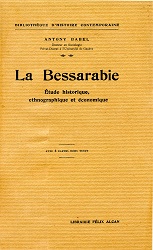
Basically, the question of Bessarabia arises, now, as in the past, in relation to that of the Straits. The importance of Bessarabia's wheat lands may also have something to do with the attitude of the Russian government as it attempts to resume grain exports to Europe after several years of crop failures. or even starvation. But the main thing is not there. Since Finland, the Baltic States and Poland have severely restricted Russia’s access to the Baltic Sea, it has attached greater importance than ever to the Black Sea problem. // What the Soviets see above all in Bessarabia is a territory which would allow them to get closer to Constantinople and the Straits - which they continue to consider as the door of their house - and which, moreover, their would make it possible to control the mouths of the Danube. This, it seems, is the real meaning of their attitude on the Bessarabia question. In this area, as in many others, Bolshevik imperialism is a fairly exact continuation of the old Tsarist imperialism. (conclusion by the author) . // PUBLISHED BY LIBRAIRIE FÉLIX ALCAN (Paris)
More...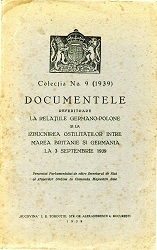
This is a collection of documents of international politics and diplomacy presented to the Romanian Parliament by the Secretary of State for Foreign Affairs at the command of His Majesty, the king. // Published in 1939 by the „BUCOVINA“ Publishing House in Bucharest (serial „Colecția“, issue nr. 9/1939)
More...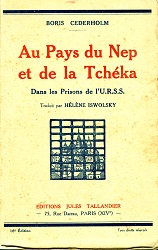
From 1924 to 1926, the Soviet government, or more precisely the Cheka, detained me, a foreigner, not guilty of any crime, in various places of detention, and finally deported me to the concentration camp. of Solovetzk for a period of three years, without prior judgment and in force by a simple decision of the Gué-Pé-Ou, in other words the Cheka. // My experiences in Soviet Russia are so implausible, because of the cruelty and cynicism shown towards me, that I have found it useful to add to this book the copy of certain documents extracted correspondence concerning my "case" and exchanged between the Consulate of Finland and the Public Commissariat of Foreign Affairs. Unfortunately, I am currently unable to publish in full the many documents relating to the talks between the Finnish government and the Soviet government regarding my arrest and release. But the few pieces that I have found opportune to publish amply confirm the veracity of my account. I would like to draw the reader's attention to the fact that in the course of the following account I have changed the surnames of the people I have mentioned, as well as certain circumstances, but only in cases where I do so. I deemed it necessary for the safety of these people, who are still alive and who are in a territory where they would risk being reached by the Gué-Pé-Ou, in other words the Tcheka. (from Author’s introduction) - DIGITIZED COPY OF THE 1928 EDITION OF «EDITIONS JULES TALLANDIER», Paris
More...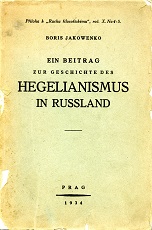
Published in Prague in 1934, the year X of the serial «Přiloha k „Ruchu filosofickému" (The Russian Thought), roč. X. No 4-5.».
More...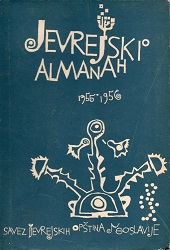
publishjed by »Savez Jevrejskih Opština Jugoslavije«, Belgrade 1956 // Dr Albert Vajs: Na kraju prve i na početku druge decenije / Dr Andrija Gams: Društvene borbe kod stvaranja stare jevrejske države Vuk Vinaver: Jevreji u Srbiji početkom XIX veka./ Dr Lavoslav Glesinger: Jevreji i Hrvati u Arapskoj Spaniji / Dr Zdenko Levntal: Jedan velikan duha: Maimonides / Dr Samuel Pinto: Prosvjetne prilike bosanskih Jevreja za turske vladavine / Prof. Miroslava Despot: Zagrebački knjižar Lavoslav Hartman / Ladislav Fišer: Jevrejstvo Bačke / Jakir Eventov: Omladina iz 1918 godine / Jakov Atijas: „Esperansa“ — Jevrejski sefardski studentski klub u Zagrebu ./ Aron Alkalaj: Dvanaest godina Jevrejske čitaonice u Beogradu 1929—1941 / Mirko Sekelj: Učešće subotičke. jevrejske omladine u borbi protiv okupatora ./ Avram R. Mevorah: O radu Saveza jevrejskih opština prvih dana po oslobođenju Beograda / Aleksandar Levi: Dva potresna muzeja / Vera Stein-Ehrlich: čudo regeneracije / Bata Gedalja: Dr Fridrih Pops / Aron Alkalaj: Sećanja na Isaka Mašijaha / Sofija Almuli: Jelena Demajo / Maja Bošković: Magda Bošković / Edita Vajs: O jevrejskim dečjim zabavištima / Aleksandar-Dov Stajner: Logorovanje naše omladine / Dr Arje Levavi: Izrael danas / Cvi Loker: Razni aspekti jugoslovensko-izraelskih odnosa / David A. Alkalaj: Jugoslovenska alija / Dr Jakov H. Kalderon: O izraelskoj štampi / Dr Pavle Neuberger: Jugoslovenski Jevreji u SAD / Dr Solomon Gaon: Svetska sefardska federacija i njen kongres u Jerusalimu 1954 / Marko Marković: Pripovjedački lik Isaka Samokovlije / Bogdan Ciplić: Sećanje na Nenada Mitrova / Isak Samokovlija: Sarajevska megila / Ivo Andrić: Na jevrejskom groblju u Sarajevu / Hinko Gottlieb: Legenda o zimskom kaputu / Pavao Wertheim: „Baharaški rabin44 H. Heinea / Heinrich Heine: Djevojčica momku bje mila. — Gdje? / Heinrich Heine: Sleski tkalci / Zaječi, naša tugo / Liza i Oto Bihalji-Merin: Ulica mrtvih Jevreja / Gustav Krklec: Jevrejka s Bjelava / Desanka Maksimović: Suma u Izraelu / Ervin Sinko: Nisam se rodio da budem ganef! (Odlomak iz knjige: „Roman jednog romana" / Zak Konfino: Tiju Menahem razmatra slučaj Kraljevića Marka / Božidar Kovačević: Dete / Jožef Debreceni: Neverovatno leto / Magda Bošković: Mi Građanska djeca / Ljubiša Jocić: U varšavskom getu / Andreja Deak: Jevrejska legenda / Istvan Braun-Kvazimodo: I uspomene imaju svoju sudbinu / Dr Zeljko Lador-Lederer: Priča o tome kako se pet knjiga našlo na okupu 339 Ivan Ivanji: Pitanje Josipa Flavija / Đula Lukač: „Polizeistunde" / Maja Zrnič: Hijene./ Julija Najman: Riki se vratila / Eva TiČak-Vajler: Susret na Jadranu / Sonja Nahman-Premeru: Starost / Josef Finci: Liječnik / Rikica Ovadija: Dobar dan, ja sam Bunks / Vlada Rotbart: Ponovno viđenje / Vesna Demajo: Prsten / Zoran Gavrilović: Džon Hersej: „Zid" / Dr Teodor Kovač: Testament (Stevan Kvazimodo: Testamentum, roman) / Hronologija važnijih događaja iz života jevrejske zajednice u Jugoslaviji (1954 i 1955) / Bibliographia judaica jugoslavica 1945—1955 / Beleške o saradnicima i radovima.
More...
In clear, concise language, Matzhold outlines the situation and the way of life in the Balkan countries, always drawing from his own experience. Pressed and influenced by a dozen different ideologies and religions, they represent a source of fire that begins to flicker incessantly in the most diverse places. The great contrasts are described which exist economically, politically and socially in the heart of the Balkan man, in his family, in the states and finally in the whole region and are in conflict with each other. Here the bandages are mercilessly torn from a wound that keeps Europe feverish and threatens the Balkans themselves, indeed the whole world, with a new war. In the author's view, the fate of the West, of contemporary European civilization, will be decided in the Balkans. (blurb of the original edition) PUBLISHED IN 1936 BY L. W. SEIDEL VERLAG, VIENNA - written by the head correspondent of Associated Press to the Balkans
More...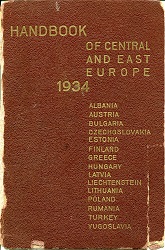
You can read geographical data, a historical overview, and population data about the countries listed in the subheading. We can find out what animals and plants live in the given place and what is worth hunting. Mineral resources are also mentioned in the volume, not to mention rivers and lakes. We can obtain important information about the country's export and import articles, agriculture and religion. You can even find out the addresses of embassies, the dates of fairs and major holidays, and the addresses of important daily newspapers from the publication. (blurb of the original edition) // FIRST PUBLISHED IN 1932 BY THE CENTRAL EUROPEAN TIMES PUBLISHING CO. LTD., ZÜRICH, SWITZERLAND. THIS DIGITISED VERSION IS MADE FROM THE 1934 EDITION.
More...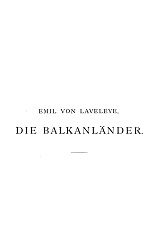
My path leads me again to the Slav peoples of the Danube and Balkan countries. I want to see how the Zadrugas — the home or family communities — which excited me so much on my journey in 1867, have changed since then. Leroy-Beaulieu and Moritz Block severely criticized my antiquated conception of those venerable communities, while Stuart Mill shared it and Henry Maine understood it. Under Bishop Strossmayr's guidance, I will first inspect the Zadrugas of Slavonia in the Djakovo area, then I will continue my observations in Bosnia, Serbia and Bulgaria, learning about the political and economic situation of these countries, which I have already discussed in my book »Prussia and Austria since Sadowa«. The favorable opportunity to undertake such investigations must be seized without hesitation, because a rapid transformation is taking place under the influence of railways, new constitutions and closer ties with Western Europe. The inhabitants of those countries will soon exchange their peculiar, hundred-year-old customs and customs, their picturesque costumes for what ist usually called modern civilization, and then regulate their whole way of thinking and living in the manner of Paris or London. I hear tremendous changes have taken place since 1867. (From the author's introduction)
More...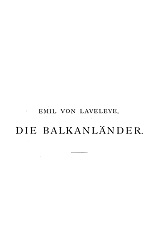
Since the publication of the first volume of my book on the Balkans, everyone has been looking at them with growing fear. It is feared that a clash is taking place there between the Russians and Austrians, affecting all the peoples of Europe and North Asia, from Mount Etna to the North Cape and from the Atlantic Ocean to the distant shores of the Pacific and the mouths of the Amur. But how can the events in Bulgaria, which is so far away, threaten the peace that all peoples and, it seems, all princes want to keep? Well, we are standing at a turning point in history, where the die is to be cast that will decide the fortunes of the East and consequently also of the West. (From the author's introduction)
More...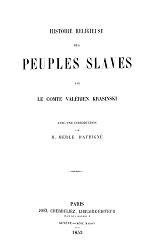
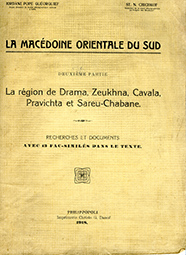
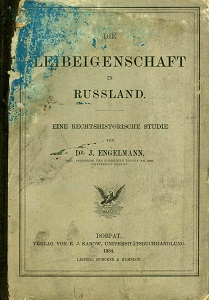
Published in 1884 by Duncker & Humblot Publishing House in Leipzig, // Editorial remark by the Author: „This study was already published in the years 1880 and 1881 in the Baltic Monthly (vols. XXVII and XXVIII) under the title “The emergence and abolition of serfdom in Russia”. The work now appears with references to sources and has been supplemented and completed throughout and can therefore be viewed as an improved and enlarged edition. The first pages have been completely reworked based on new research; otherwise the opinion has remained unchanged. Larger additions relate to the property situation in the north of Russia after the collapse of Novgorod independence, to the position of the code of 1649 and the so-called Great Commission of Catherine II on serfdom. Newly added is Chapter IX.
More...
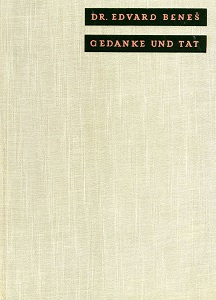
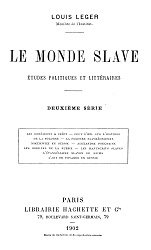
Original published nin 1902 by Librairie Hachette et Cie, Paris
More...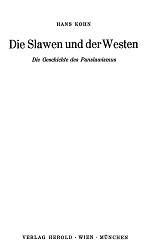
Title of the American Original: «Pan-Slavism. Its History and Ideology», published by University of Notre Dame Press, Notre Dame, Indiana, USA. German edition published in 1956 by HEROLD Verlagsgesellschaft, Vienna-Munich, authorised translation to German by Dr. Helge Pross
More...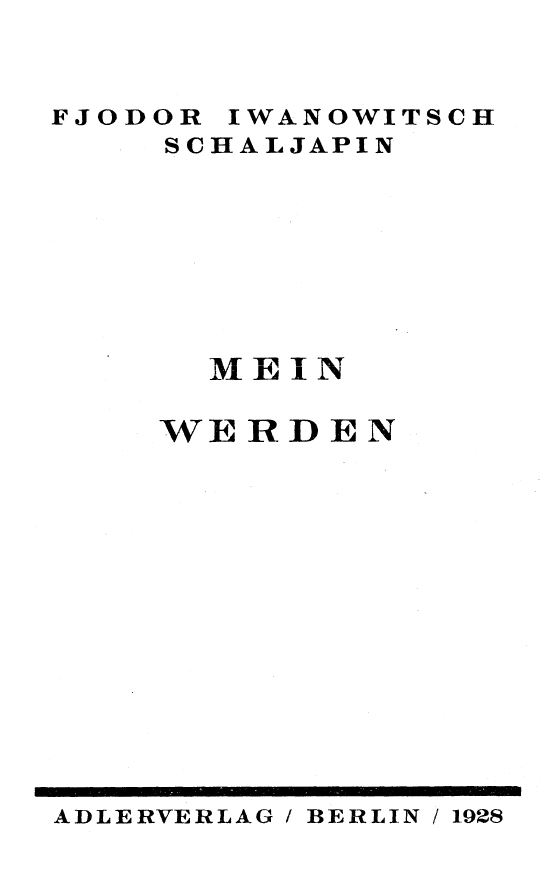
autobiographic work of Fjodor Iwanowitsch Schaljapin. published in German language in the year of his death, 1938, ba Adlerverlag in Berlin
More...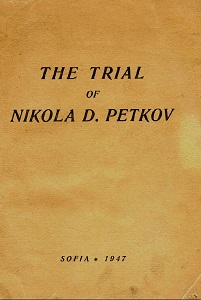
published in 1947 by the Bulgarian Ministry of Information and Arts / Press Department
More...